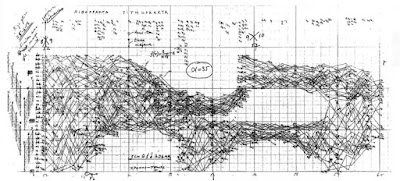Exformation (Cont.)
 |
| Xenakis's Pithoprakta |
From the recent book Subtract:
"We asked people to change random loops of musical notes. They were about three times more likely to add notes then to take them away. It was roughly the same 3 to 1 ratio when we tasked people with improving a piece of writing. We asked participants to transform a five-ingredient soup. 2 out of 90 participants subtracted ingredients." (p. 27)
It is typically the case in a multi-track recording--especially if you have a lot of tracks--or unlimited tracks, to keep piling them on. I do this particularly with guitar and keyboard parts. But at mixing time I have found myself removing a lot of the tracks that I recorded.
I think all of us have a proclivity to want to add things rather than subtract things. I found that the best mixes emerged from the ones that opted for translucency--where you can discern one idea from another idea--where you can "see-through" the piece, and for me, to reduce it to raw musical elements that can be played manually on a guitar or piano.
Habits and routines also tend to make us less sensitive to mindless addition rather than subtraction. Recently, at my favorite Middle Eastern restaurant, the Falafel was extremely spicy and had too much black pepper in them. I think what they do is simply spice the Falafel by tossing salt and pepper in them without measuring it. Measuring is an extra step, and when we become lazy we use shortcuts. It is in fact a form of subtraction, but in the wrong way.
The internet also lets us add too many things. It is one of the primary mediums where we feel that we have to add something. Personally, I like the idea of exformation, the essence of ideas after all the extraneous information has been discarded. Themes are a form of exformation because themes are something we can use continuously like a cooking utensil. Many foods can be made using them.
The other obvious way we can look at this problem is the extraction of signal from noise. This works too, but what do we do when we have too much signal? Reducing noise is manageable, but what if lots of signal is equally important? You have to add and subtract on a continuum, which is what I've always done. For example, in multi-track recording, subtraction might work for one song, but then all the songs on the album have to fit with that heuristic, which may mean potentially useful signal will need to be removed.
Comments